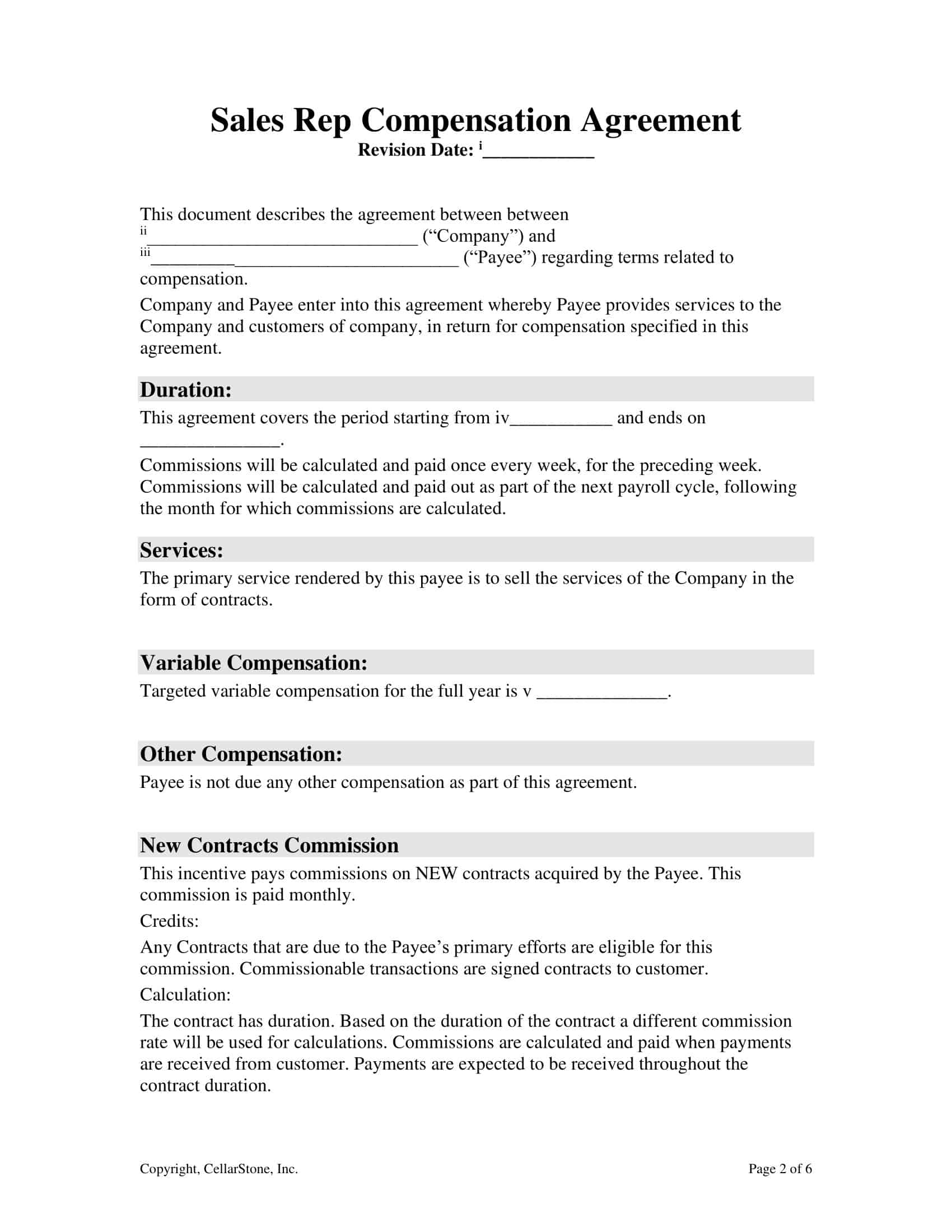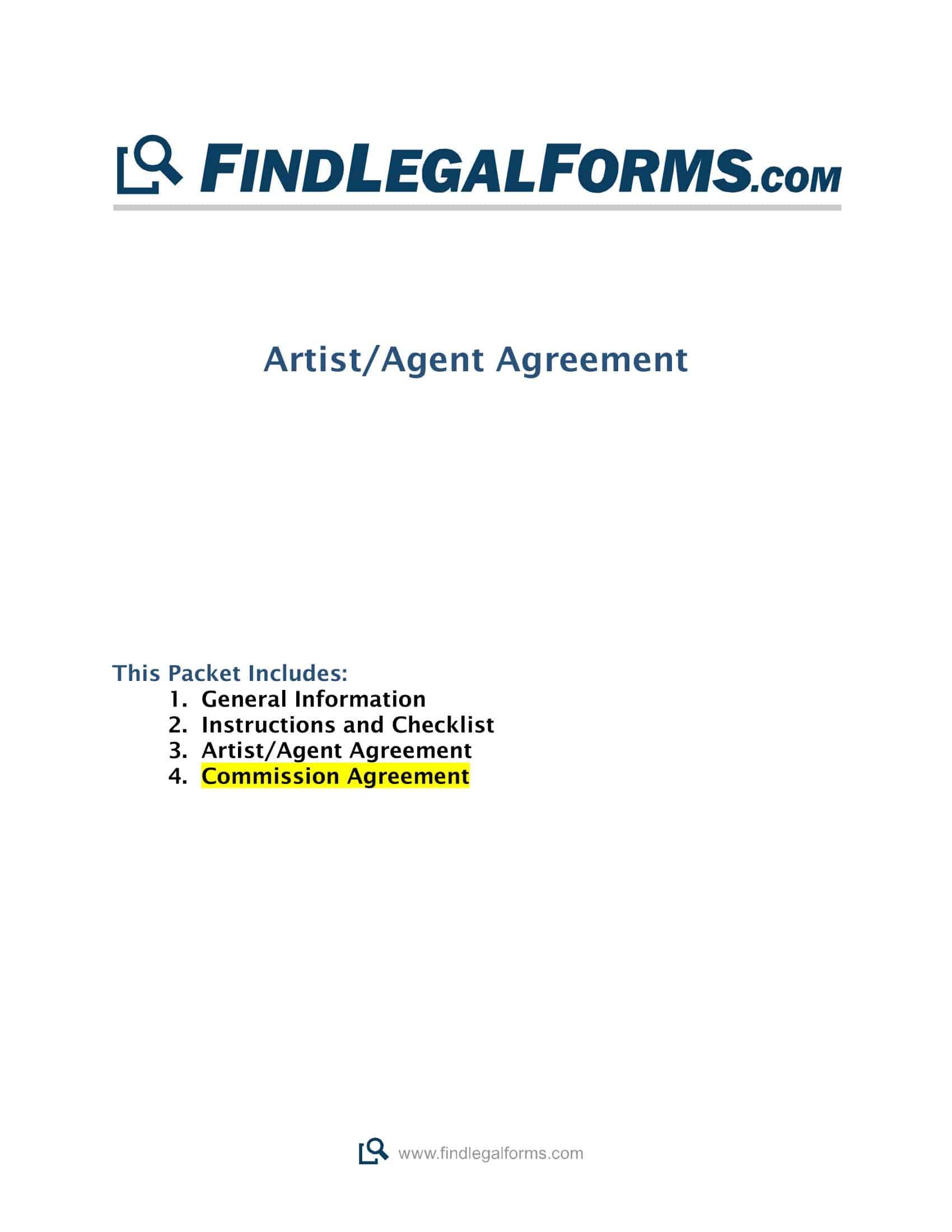Commission-based compensation is a common method used in various industries, where an employee is paid a percentage of the sales they make. A commission agreement is a legally binding document that outlines the terms and conditions of the employment, including the employee’s compensation.
It is crucial for both the employer and the employee to have a clear understanding of the expectations and responsibilities outlined in the agreement, to avoid any misunderstandings or disputes.
Table of Contents
Commission Agreement Templates
Commission agreement templates are pre-designed documents that provide a structured format for creating legally binding contracts between a company or individual and a sales representative or agent. These templates offer a convenient and professional way to outline the terms and conditions of a commission-based arrangement, ensuring clarity and mutual understanding between the parties involved.
Commission agreement templates typically include sections that address important aspects such as the scope of work, commission structure, payment terms, performance targets, confidentiality clauses, and any additional provisions or requirements specific to the arrangement. They may also incorporate sections for capturing the parties’ details, signatures, and dates to ensure the agreement’s legality.
Using a commission agreement template helps establish a clear and fair framework for compensating sales representatives or agents based on their performance and contribution to generating sales or acquiring clients. The template provides a standardized format that simplifies the creation of the agreement and ensures that all critical information is properly documented and communicated.
When should you use a commission agreement ?

A commission agreement should be used when an employee will be working on a commission-based compensation structure. This means that the employee will be paid a percentage of the sales they make, rather than a fixed salary or hourly wage.
A commission agreement should be used to clearly outline the terms and conditions of the employment, including the employee’s compensation, expectations, and responsibilities. It should be used as soon as the employer and employee have agreed to a commission-based compensation structure, to ensure that both parties have a clear understanding of the terms and conditions of the employment.
Types of commission agreements
There are several types of commission agreements, including:
Straight Commission: Salespeople are paid a percentage of the sales they make.
Draw Against Commission: Salespeople are given an advance, or “draw,” against their future commission earnings.
Base Salary plus Commission: Salespeople are paid a base salary, in addition to a commission on their sales.
Residual Commission: Salespeople are paid a commission on the ongoing revenue generated by their sales.
Hybrid Commission: A combination of two or more of the above types of commission agreements.
Commission only: Salespeople are paid only on the commission they make and not on the base salary.
It’s important to note that commission agreements vary widely depending on the industry, company and the salesperson’s role. Each type of commission agreement has its own unique benefits and drawbacks, and should be chosen based on the specific needs of the company and the salesperson.
Essential Parts of a commission agreement
A commission agreement is a legal contract between two parties, where one party (the employer or principal) hires another party (the sales representative or agent) to sell goods or services on their behalf. The agreement outlines the terms and conditions of the sales representative’s work, including their responsibilities, compensation, and any other relevant details.
The following are the key parts of a commission agreement:
Parties Involved
This section outlines the names and contact information of the employer and the sales representative.
Description of Services
This section describes the specific goods or services that the sales representative will be selling on behalf of the employer. It also includes any specific territory or market that the sales representative will be responsible for.
Compensation
This section outlines how the sales representative will be compensated for their work. This typically includes a commission percentage or flat rate for each sale made, as well as any bonuses or incentives that may be offered.
Duration of Agreement
This section specifies the length of time the agreement will be in effect. It also includes information about how the agreement can be terminated, such as by giving notice or for cause.
Exclusive Sales
This section specifies whether the sales representative has an exclusive right to sell the employer’s goods or services in a particular territory or market.
Non-Competition
This section specifies any restrictions on the sales representative’s ability to work for a competing company after the agreement is terminated.
Confidentiality
This section outlines the sales representative’s responsibilities with respect to confidential information, such as trade secrets or other proprietary information.
Indemnification
This section specifies that the sales representative will be held liable for any damages caused to the employer as a result of the sales representative’s actions.
Governing Law
This section specifies the state or jurisdiction whose laws will govern the agreement.
Dispute Resolution
This section outlines the process for resolving disputes that may arise under the agreement, such as arbitration or mediation.
Signatures
This section includes the signatures of both parties, indicating their acceptance of the terms and conditions outlined in the agreement.
It is important to note that commission agreements may vary depending on the jurisdiction and the specific industry, and should be reviewed by a lawyer before being executed.
How do you set up a commission structure?
When creating the structure for a commission agreement, it is important to include the following key elements:
The parties involved: This should include the names of the employer and the employee or independent contractor who will be receiving the commission.
The terms of the agreement: This should include the start and end date of the agreement, as well as any specific terms and conditions that apply.
The commission rate: This should specify the percentage or dollar amount of the commission that will be paid, as well as any contingencies or conditions that must be met in order for the commission to be earned.
Payment terms: This should specify when and how the commission will be paid, including any deadlines for payment and any deductions or withholdings that will be taken.
Termination provisions: This should specify the conditions under which the agreement can be terminated, and what will happen to any unpaid or earned but unpaid commission in the event of termination.
Governing law, Jurisdiction and dispute resolution: This should specify the laws that govern the agreement and jurisdiction in case of any dispute and the method of dispute resolution.
It’s always a good idea to consult a lawyer to make sure that your commission agreement is legally compliant, and to ensure that all of the necessary elements are included.
FAQs
Who is typically covered by a commission agreement?
A commission agreement typically covers an employee or independent contractor who will be receiving commission payments based on their performance or sales.
How is commission calculated in a commission agreement?
Commission is typically calculated as a percentage of sales or revenue, or as a fixed dollar amount for each sale or performance. The commission rate is usually specified in the commission agreement.
When should a commission agreement be used?
A commission agreement should be used when an employer wants to establish a commission-based compensation arrangement with an employee or independent contractor.
How can I make sure my commission agreement is legally compliant?
It is always a good idea to consult a lawyer to make sure that your commission agreement is legally compliant and includes all necessary elements.
Can a commission agreement be changed or modified?
Yes, a commission agreement can be changed or modified with the mutual consent of both parties involved. It is important to document any changes or modifications to the agreement in writing.
How long does a commission agreement last?
The duration of a commission agreement can vary. It can be for a specific period of time or it can be open-ended. It is specified in the agreement.
What happens to the commission if an employee is terminated?
The commission agreement should specify what happens to the commission in the event of termination. It could be that the employee is entitled to any earned but unpaid commission, or it could be that the commission is forfeited upon termination.
What happens if a dispute arises under the commission agreement?
The commission agreement should specify the method of dispute resolution, which could be mediation, arbitration or going to court. The agreement’s governing law and jurisdiction also should be specified.
Do I need to register the commission agreement with any government body?
No, the commission agreement does not need to be registered with any government body. However, it should be kept on file by both parties for future reference.






































![Free Printable Roommate Agreement Templates [Word, PDF] 1 Roommate Agreement](https://www.typecalendar.com/wp-content/uploads/2023/06/Roommate-Agreement-150x150.jpg)
![Free Printable Credit Card Authorization Form Templates [PDF, Word, Excel] 2 Credit Card Authorization Form](https://www.typecalendar.com/wp-content/uploads/2023/06/Credit-Card-Authorization-Form-150x150.jpg)
![Free Printable Stock Ledger Templates [Excel,PDF, Word] 3 Stock Ledger](https://www.typecalendar.com/wp-content/uploads/2023/08/Stock-Ledger-150x150.jpg)
